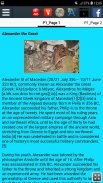




Biography Alexander The Great

Biography Alexander The Great介绍
Alexander III of Macedon (20/21 July 356 BC – 10/11 June 323 BC), commonly known as Alexander the Great (Greek: Ἀλέξανδρος ὁ Μέγας, Aléxandros ho Mégas Koine Greek: [a.lék.san.dros ho mé.gas] ), was a king (basileus) of the Ancient Greek kingdom of Macedon and a member of the Argead dynasty. Born in Pella in 356 BC, Alexander succeeded his father, Philip II, to the throne at the age of twenty. He spent most of his ruling years on an unprecedented military campaign through Asia and northeast Africa, and by the age of thirty he had created one of the largest empires of the ancient world, stretching from Greece to northwestern India. He was undefeated in battle and is widely considered one of history's most successful military commanders.
During his youth, Alexander was tutored by the philosopher Aristotle until the age of 16. After Philip's assassination in 336 BC, Alexander succeeded his father to the throne and inherited a strong kingdom and an experienced army. Alexander was awarded the generalship of Greece and used this authority to launch his father's Panhellenic project to lead the Greeks in the conquest of Persia.In 334 BC, he invaded the Achaemenid Empire (Persian Empire), and began a series of campaigns that lasted ten years. Following the conquest of Asia Minor, Alexander broke the power of Persia in a series of decisive battles, most notably the battles of Issus and Gaugamela. He subsequently overthrew the Persian King Darius III and conquered the Achaemenid Empire in its entirety. At that point, his empire stretched from the Adriatic Sea to the Indus River.
Seeking to reach the "ends of the world and the Great Outer Sea", he invaded India in 326 BC, but eventually turned back at the demand of his homesick troops. Alexander died in Babylon in 323 BC, the city he planned to establish as his capital, without executing a series of planned campaigns that would have begun with an invasion of Arabia. In the years following his death, a series of civil wars tore his empire apart, resulting in several states ruled by the Diadochi, Alexander's surviving generals and heirs.
马其顿的亚历山大三世(20/21七月公元前356年 - 10/11六月公元前323年),俗称亚历山大大帝(希腊语:ἈλέξανδροςὁΜέγας,亚历山德罗豪MEGAS通用希腊语:[a.lék.san.dros浩我。天然气]),是马其顿的古希腊王国的国王(巴赛勒斯)和阿吉德王朝的一员。出生在佩拉于公元前356年,亚历山大在二十岁时继承了父亲菲利普二世,王位。他在亚洲和非洲东北部花费了大多数他的裁决年前所未有的军事行动,并通过三十岁,他创造了古代世界最大的帝国之一,从希腊一直延伸到印度西北部。他在战斗中保持不败,被广泛认为是历史上最成功的军事指挥官之一。
在他的青年时期,亚历山大是由哲学家亚里士多德直到年龄16菲利普在公元前336年被暗杀后辅导,亚历山大继承他父亲的王位继承和强大的王国,一个有经验的军队。亚历山大被授予希腊的大将,并使用这一权力,推出了他父亲的泛希腊项目引领Persia.In公元前334年征服希腊人,他侵入了阿契美尼德王朝(波斯帝国),并开始了一系列的运动是延长到十年年份。继小亚细亚的征服,亚历山大波斯爆发的力量在一系列决定性的战役,伊苏斯和高加米拉最引人注目的战斗。他随后推翻了波斯国王大流士三世,并在其全部征服了阿契美尼德王朝。在这一点上,他的帝国从亚得里亚海到印度河捉襟见肘。
求达到“世界和大外海的目的”,他在公元前326年入侵印度,但最终还是转身回到他想家部队的需求。亚历山大在巴比伦死于公元前323,他计划建立作为他的首都城市,没有执行一系列计划活动中,将有与阿拉伯半岛的入侵开始了。在跟随他的死亡的年中,一系列的内战撕毁了他的帝国分开,导致了Diadochi,亚历山大的幸存将军和统治的继承人几个州。


























